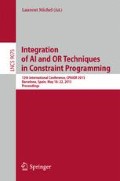Abstract
We present a new learning scheme for CSP solvers, which is based on learning (general) constraints rather than generalized no-goods or signed-clauses that were used in the past. The new scheme is integrated in a conflict-analysis algorithm reminiscent of a modern systematic SAT solver: it traverses backwards the conflict graph and gradually builds an asserting conflict constraint. This construction is based on new inference rules that are tailored for various pairs of constraints types, e.g., \(x \le y_1 + k_1\) and \(x \ge y_2+ k_2\), or \(y_{1}\le x\) and \([x,y_{2}]\not \subseteq [a,b]\). The learned constraint is stronger than what can be learned via signed resolution. Our experiments show that our solver HCSP backtracks orders of magnitude less than other state-of-the-art solvers, and is overall on par with the winner of this year’s MiniZinc challenge.
Access this chapter
Tax calculation will be finalised at checkout
Purchases are for personal use only
Preview
Unable to display preview. Download preview PDF.
References
The HCSP Constraint Solver web page. http://tx.technion.ac.il/mveksler/HCSP/
Fourth international CSP solver competition (2009). http://cpai.ucc.ie/09/index.html
Minizinc challenge (2014). http://www.minizinc.org/challenge2014/
Opturion CPX - tool description (2014). http://www.minizinc.org/challenge2014/description_opturion_cpx.txt
Beckert, B., Hähnle, R., Manyá, F.: The SAT problem of signed CNF formulas, pp. 59–80 (2000)
Biere, A.: Bounded model checking. In: Biere, A., Heule, M., van Maaren, H., Walsh, T. (eds.) Handbook of Satisfiability. Frontiers in Artificial Intelligence and Applications, vol. 185, pp. 457–481. IOS Press (2009)
Boussemart, F., Hemery, F., Lecoutre, C., Sais, L.: Boosting systematic search by weighting constraints. In: López de Mántaras, R., Saitta, L. (eds.) ECAI, pp. 146–150. IOS Press (2004)
Choi, C.W., Harvey, W., Lee, J.H.M., Stuckey, P.J.: Finite domain bounds consistency revisited. In: Sattar, A., Kang, B.-H. (eds.) AI 2006. LNCS (LNAI), vol. 4304, pp. 49–58. Springer, Heidelberg (2006)
Cotton, S., Maler, O.: Fast and flexible difference constraint propagation for DPLL(T). In: Biere, A., Gomes, C.P. (eds.) SAT 2006. LNCS, vol. 4121, pp. 170–183. Springer, Heidelberg (2006)
Dechter, R.: Enhancement schemes for constraint processing: backjumping, learning, and cutset decomposition. Artif. Intell. 41(3), 273–312 (1990)
Dixon, H.E., Ginsberg, M.L.: Inference methods for a pseudo-boolean satisfiability solver. In: Dechter, R., Sutton, R.S. (eds.) Proceedings of the Eighteenth National Conference on Artificial Intelligence and Fourteenth Conference on Innovative Applications of Artificial Intelligence, July 28 - August 1, 2002, Edmonton, Alberta, Canada, pp. 635–640. AAAI Press / The MIT Press (2002)
Feydy, T., Stuckey, P.J.: Lazy clause generation reengineered. In: Gent, I.P. (ed.) CP 2009. LNCS, vol. 5732, pp. 352–366. Springer, Heidelberg (2009)
Fujiwara, T.: iZplus - tool description (2014). http://www.minizinc.org/challenge2014/description_izplus.txt
Gent, I.P., Miguel, I., Moore, N.C.A.: Lazy explanations for constraint propagators. In: Carro, M., Peña, R. (eds.) PADL 2010. LNCS, vol. 5937, pp. 217–233. Springer, Heidelberg (2010)
Stuckey, P.J., Chu, G.: Structure based extended resolution for constraint programming. http://arxiv.org/abs/1306.4418
Hebrard, E.: Mistral, a constraints satisfiaction library. In: Third international CSP solver competition, pp. 31–40 (2008)
Jain, S., Sabharwal, A., Sellmann, M.: A general nogoodlearning framework for pseudo-boolean multi-valued SAT. In: Burgard, W., Roth, D. (eds.) Proceedings of the Twenty-Fifth AAAI Conference on Articial Intelligence, AAAI 2011, San Francisco, California, USA, August 7–11, 2011. AAAI Press (2011)
Jovanovic, D., de Moura, L.M.: Cutting to the chase - solving linear integer arithmetic. J. Autom. Reasoning 51(1), 79–108 (2013)
Katsirelos, G., Bacchus, F.: Unrestricted nogood recording in CSP search. In: Rossi, F. (ed.) CP 2003. LNCS, vol. 2833, pp. 873–877. Springer, Heidelberg (2003)
Katsirelos, G., Bacchus, F.: Generalized nogoods in CSPs. In: Veloso, M.M., Kambhampati, S. (eds.) AAAI, pp. 390–396. AAAI Press / The MIT Press (2005)
Liu, C., Kuehlmann, A., Moskewicz, M.W.: CAMA: a multi-valued satisfiability solver. In: ICCAD, pp. 326–333. IEEE Computer Society / ACM (2003)
Moskewicz, M., Madigan, C., Zhao, Y., Zhang, L., Malik, S.: Chaff: engineering an efficient SAT solver. In: Proc. Design Automation Conference (DAC 2001) (2001)
Nethercote, N., Stuckey, P.J., Becket, R., Brand, S., Duck, G.J., Tack, G.R.: MiniZinc: towards a Standard CP Modelling Language. In: Bessière, C. (ed.) CP 2007. LNCS, vol. 4741, pp. 529–543. Springer, Heidelberg (2007)
Nieuwenhuis, R.: The IntSat method for integer linear programming. In: O’Sullivan, B. (ed.) CP 2014. LNCS, vol. 8656, pp. 574–589. Springer, Heidelberg (2014)
Ohrimenko, O., Stuckey, P.J., Codish, M.: Propagation via lazy clause generation. Constraints 14(3), 357–391 (2009)
Strichman, O.: Tuning SAT checkers for bounded model checking. In: Emerson, E.A., Sistla, A.P. (eds.) CAV 2000. LNCS, vol. 1855, pp. 480–494. Springer, Heidelberg (2000)
Veksler, M., Strichman, O.: A proof-producing CSP solver. In: Proceedings of the Twenty-Fourth AAAI Conference on Artificial Intelligence (2010)
Veksler, M., Strichman, O.: A proof-producing CSP solver (a proof supplement). Technical Report IE/IS-2010-02, Industrial Engineering, Technion, Haifa, Israel, January 2010. Available also from [1]
Veksler, M., Strichman, O.: Learning non-clausal constraints in csp (long version). Technical report, Technion, Industrial Engineering, IE/IS-2014-05 (2014). Available also from [1]
Author information
Authors and Affiliations
Corresponding author
Editor information
Editors and Affiliations
Rights and permissions
Copyright information
© 2015 Springer International Publishing Switzerland
About this paper
Cite this paper
Veksler, M., Strichman, O. (2015). Learning General Constraints in CSP. In: Michel, L. (eds) Integration of AI and OR Techniques in Constraint Programming. CPAIOR 2015. Lecture Notes in Computer Science(), vol 9075. Springer, Cham. https://doi.org/10.1007/978-3-319-18008-3_28
Download citation
DOI: https://doi.org/10.1007/978-3-319-18008-3_28
Published:
Publisher Name: Springer, Cham
Print ISBN: 978-3-319-18007-6
Online ISBN: 978-3-319-18008-3
eBook Packages: Computer ScienceComputer Science (R0)

